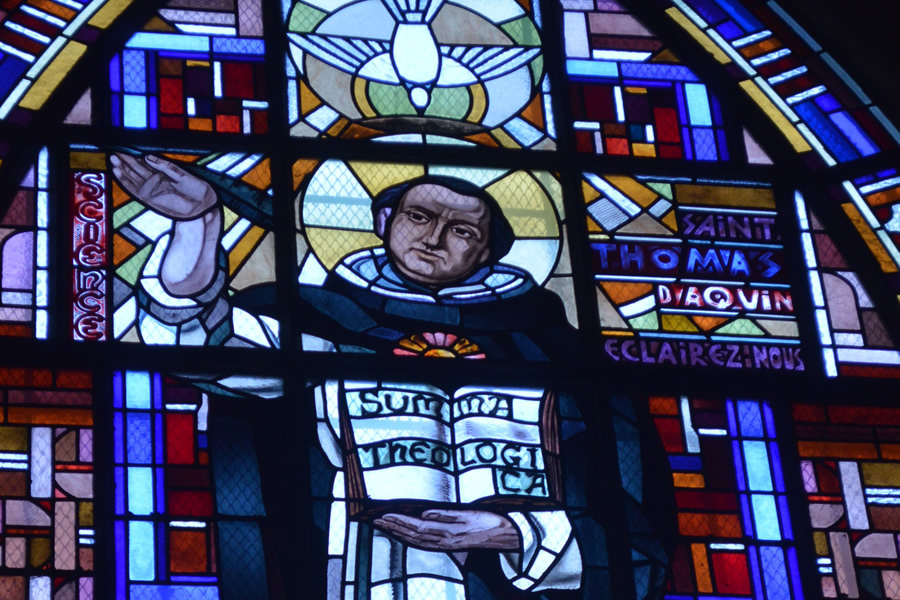
Feast of St. Thomas Aquinas
01-26-2020Pastor's LetterFr. Dan ConnealyHappy Sunday!
This Tuesday the Church celebrates the memorial of St. Thomas Aquinas, commonly called the Angelic Doctor. St. Thomas lived in the 13th century and was the most significant Scholastic of the period. Though a member of the Order of Friars Preachers, or Dominicans, he grew up in a wealthy family in Italy. Having expressed his desire to enter religious life his family sought a "suitable" position for him at the famous Benedictine monastery Monte Cassino. However, St. Thomas' desire was to live as a mendicant among the newly founded Dominican order. After much, and sometimes aggressive, protestation from his family he took the white habit. He became a student of St. Albert the Great. Once, when a fellow student mocked his oafish demeanor during class by calling him a dumb ox, St. Albert responded, "We call this man a dumb ox, but his bellowing in doctrine will one day resound throughout the world." His professor's prediction proved accurate. St. Thomas would go on to write the great Summa Theologica, and though it was never completed, it is still one of the most significant theological works in the history of the Church. Intended for seminarians and the literate faithful, it begins by addressing the questions of God's existence and the creation of man. This is commonly called natural theology, it is the things one can know through reason alone without divine revelation. St. Thomas then moves on addressing law, the moral life, the life of Christ, divine revelation, and more.
In the 19th century Pope St. Leo XIII called for a renewal of studying St. Thomas' works. If you are interested in learning from the Summa Theologica, it can be found online at aquinas101.thomisticinstitute.org. There also many helpful summaries and commentaries on St. Thomas Aquinas' work, including titles by Peter Kreeft (Summa of the Summa), Msgr. Paul Glenn (A Tour of the Summa), and G.K. Chesterton's biography on St. Thomas Aquinas.
Have a great week and as always know of my prayers!
In Christ,
Fr. Connealy
¡Feliz domingo!
Este martes, la Iglesia celebra el memorial de Santo Tomás de Aquino, comúnmente llamado el Doctor Angélico. Santo Tomás vivió en el centuria XIII y fue el escolástico más significativo de la época. Aunque era miembro de la Orden de los Predicadores de los Frailes, o dominicanos, creció en una familia pudiente en Italia. Habiendo expresado su deseo de entrar en la vida religiosa, su familia buscó una posición "adecuada" para él en el famoso monasterio benedictino Monte Cassino. Sin embargo, el deseo de Santo Tomás era vivir como mendigo entre la recién fundada orden dominicana. Después de muchas, y a veces agresivas, protestas de su familia, tomó el hábito blanco. Se convirtió en alumno de San Alberto Magno. Una vez, cuando un compañero de estudios se burló de su comportamiento zafio durante la clase llamándolo un buey tonto, San Alberto respondió: "Llamamos a este hombre un buey tonto, pero su bramido doctrinal algún día resonará en todo el mundo". La predicción de su profesor resultó ser exacto. Santo Tomás continuó a escribir la gran Summa Theologica, y aunque nunca se completó, sigue siendo una de las obras teológicas más importantes en la historia de la Iglesia. Destinado a seminaristas y fieles alfabetizados, comienza abordando las cuestiones de la existencia de Dios y la creación del hombre. Esto se llama comúnmente teología natural; son las cosas que uno puede saber solo de la razón sin revelación divina. Santo Tomás luego aborda la ley, la vida moral, la vida de Cristo, la revelación divina y más.
En el siglo XIX, el Papa San León XIII pidió una renovación del estudio de las obras de Santo Tomás. Si está interesado en aprender de la Summa Theologica, puede encontrarla en línea en aquinas101.thomisticinstitute.org. También hay muchos resúmenes y comentarios útiles sobre el trabajo de Santo Tomás de Aquino, incluidos los títulos de Peter Kreeft (Summa of the Summa), Mons. Paul Glenn (A Tour of the Summa) y la biografía de G.K. Chesterton sobre Santo Tomás de Aquino. ¡Que tengan una gran semana y, como siempre, sepan mis oraciones!
En Cristo,
El p. Connealy